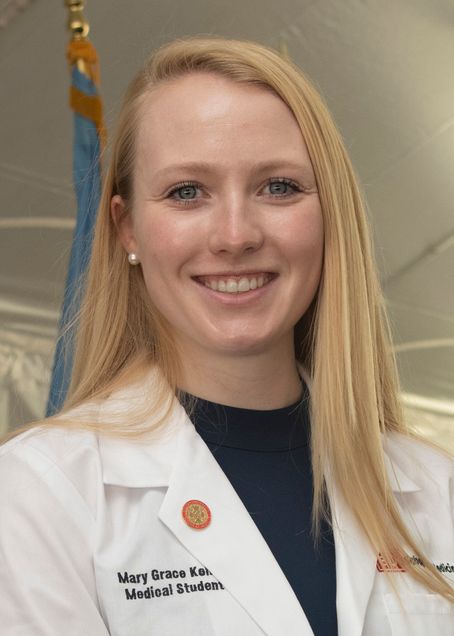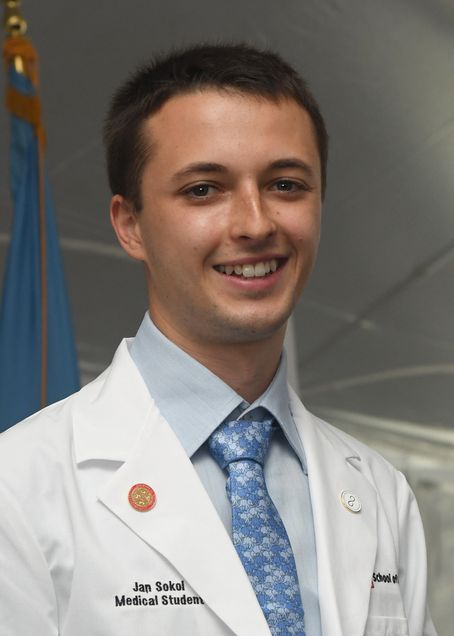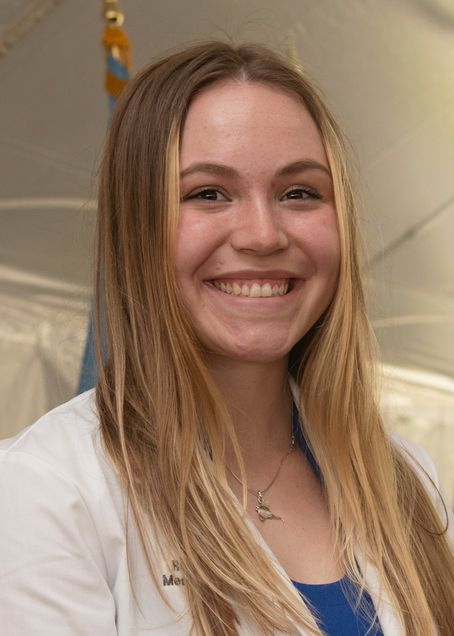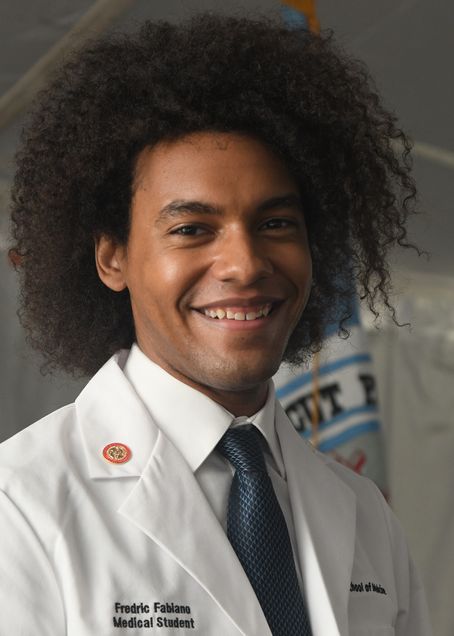Six First-Year Students Reflect on the Importance of Their White Coats
August is always an exciting time of year, as we officially welcome a new class of students to the study of medicine during the White Coat Ceremony. The Class of 2025 comprises talented students who bring varied backgrounds and perspectives to our community.
We asked a few members of the class to share their journey to BUSM and reflect on what the long-awaited white coat means to them.
Bahaa Abdellatif
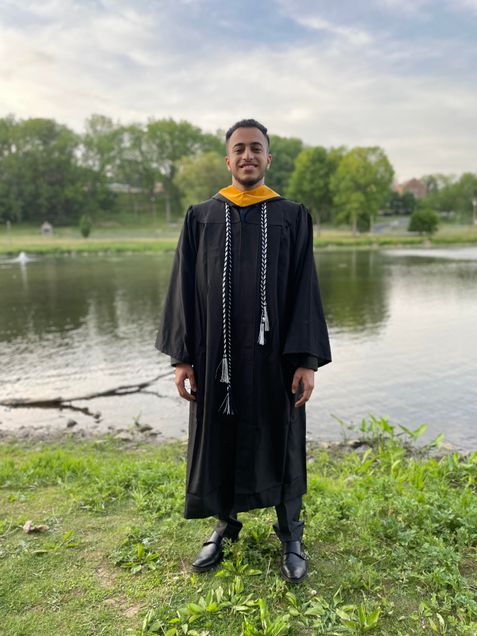
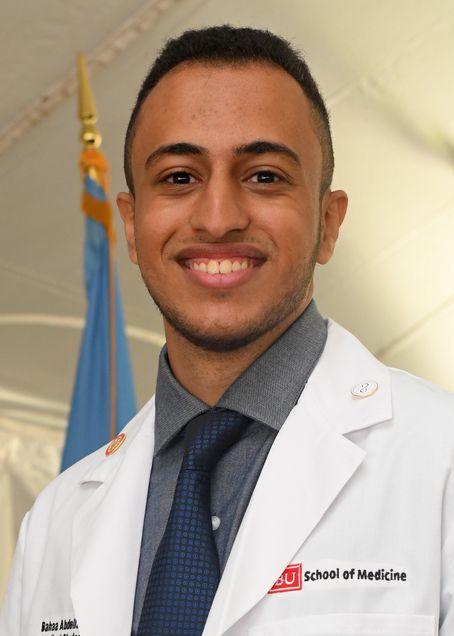
What inspired you to apply to medical school, and what was your journey to BUSM like?
I have always been a very curious person. I love asking questions, I love knowing why things work the way they do and why they look the way they are. I have always been fascinated by the human body and its complexity. I want to learn everything there is to know about it, and use that knowledge to make a real difference in my community. I applied to medical school because I want to receive an education and have a career that helps me improve the lives of those around me. I hope that one day when I am old and retired and I look back at my career, I have left an imprint on this world and changed even one person’s life for the better.
My journey to medical school was a long and difficult yet satisfying journey, one that I would repeat again in a heartbeat. Since high school I always knew that I wanted to become a doctor, therefore, once I started applying to colleges I focused on schools with great pre-med programs.
One of these schools is my alma mater Muhlenberg College. After touring the campus and doing research on the school, I knew that Muhlenberg College was the right place for me and the place that would help me achieve my dreams of becoming a doctor. However, with that came one of the hardest decisions – the decision of leaving my family and going away for college. Most Arab immigrants are not used to their children going away for college, as most attend local universities and colleges. But I will never forget how much my parents encouraged me to go to Muhlenberg, because they knew that it was the best option for me and my future.
Four years of studying hard, shadowing inspiring physicians, volunteering at various clinics and hospitals, conducting research and a plethora of extracurriculars that allowed me to be immersed in my undergraduate community have culminated in my acceptance to one of the most prestigious medical schools in the country. Now I cannot wait for the next part of my journey!
Why did you choose to attend BUSM?
A lot of different factors – the brilliant and world renowned professors, the fantastic match list, the amazing research opportunities and the location. However, the main reason I chose to attend BUSM is their unique way of approaching medicine. One of the main statements from BUSM that I came across during my research into the school was that “understanding disease means looking into the eyes as well as microscopes.” BUSM truly values the individual and puts patient care above everything else. Being affiliated with a safety net hospital like Boston Medical Center highlights how my education at BUSM will be one that emphasizes humanity and always putting patients first. I want to be at a school that produces physicians that truly care, one that centers all their attention on the needs of the patients, which is exactly why I chose this institution.
Which part of your medical school experience are you most excited for?
Recently, a group of upperclassmen made a document with advice on how to succeed at BUSM and sent it to the M1s. One of the things that really stood out is how most of the content presented in MFoM is information we already learned in prerequisite courses and in studying for the MCAT. That said, it is taught very quickly – for example, a topic we spent an entire semester on is boiled down into one, maybe two lectures. At first when I read that statement I got terrified, like I could not imagine how in less than a week, I am now expected to master something that took. me a whole semester to understand as a graduate. However, the more I thought about it, that initial fear started to dissipate and was replaced with lots of excitement.
Why do you want to be a doctor?
I want to be a doctor because it connects two very important things for me: my passion for science and my interest in having a career where interacting with people is a priority. Over the past few years, I’ve worked as a tutor, a learning assistant and a resident advisor, which further showed me how much I love interacting with people and being someone that makes a difference in their community.
Furthermore, medicine is an extremely diverse field that always provides constant opportunities for growth. The field is constantly changing, which makes me sure that I won’t feel like my career has become stagnant, medicine will always keep me on my toes which is something I am really looking for in a career. There will always be new publications that teach us something new, new research that shows how to provide better patient care and new medications that can improve countless lives.
What does your white coat mean to you?
That long desired white coat to me is a representation of all the hard work and dedication it took me to be where I am now. All the sleepless nights, the hours and hours of studying, the ups and downs of the past 22 years. It is also a symbol for what’s to come. It’s a sign of how my dream of being a physician is getting one step closer to becoming a reality. The white coat is a symbol of how soon I will get to make a difference and how I will get to help people from all different backgrounds and socioeconomic levels.
Mary Grace Kelley
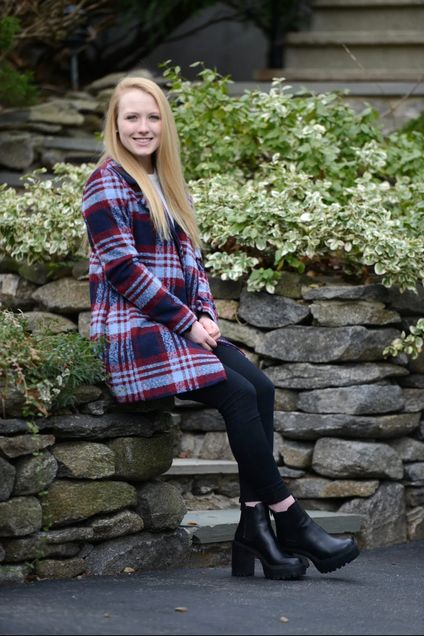
What inspired you to apply to medical school, and what was your journey to medical school like?
I grew up playing competitive ice hockey for 19 years, ultimately leading me to Boston University to play Division I. Over the years I sustained a handful of injuries, yet I was lucky enough to be a beneficiary of exceptional care in Boston. As I gained more experience in the medical field, I began to notice the undeniable similarities between sport and medicine. Medicine is a team sport and patient care is truly dependent on the efforts of every team member. I was immediately drawn to the intimacy of medicine and the ability to impact lives each day. I am determined to continue the legacy of outstanding medical care in Boston in order to give back to the community that shaped me into the passionate, unyielding woman I am today.
My journey to medical school was far from a straight line, but my time as an athlete prepared me well for the difficult path ahead. I took my MCAT three times before obtaining a respectable score and I applied to medical school in two application cycles before I was able to call BUSM home. I worked as a medical assistant during my two gap years following undergrad. My two gap years allowed me to not only mature as a person, but to also solidify my decision to pursue medical school with no apprehension. As a final leap of faith, I enrolled in Boston University’s Masters of Medical Science program, which was ultimately one of my best decisions. My story of triumphs and failures used to be something I was embarrassed of; however, my past now stands as a beacon of hope that encourages me to be persistent no matter the challenge that lies ahead.
Why did you choose to attend BUSM?
BUSM is a nationally known and well respected institution, but more importantly, the community of students, professors and faculty are so welcoming and engaging that it is so easy to fall in love with BUSM. BUSM happens to be located in my favorite city and BMC serves as the largest safety net hospital in New England. It is a unique experience to provide essential health care outreach to the communities in my home city who require it the most. The complex cases that are seen at BMC will prove to be instrumental in our education. It is truly an honor to have the opportunity to serve the community that I call home.
Which part of your medical school experience are you most excited for?
There are so many aspects of medical school that I am excited for, but one experience in particular stands out. I am very excited for third and fourth year rotations in the emergency room and surgery as I am eager to serve on the front lines of medicine in a community in great need of medical attention. I am excited to learn from some of Boston’s best physicians in the hopes of becoming the very best physician I can.
Why do you want to be a doctor?
Having grown up in the suburbs of Boston, I was exposed to outstanding health care that is truly a luxury. I am inspired by the doctors whom I have met as a patient, medical assistant and colleague. I hope to pay my passion forward to the next wave of athletes and dreamers.
What does your white coat mean to you?
The white coat stands as a symbol in the medical field, but it serves a different meaning to me. As I don my white coat for the first time, I am reminded of the challenges I have overcome and I am inspired for what the future holds. As we stand together as a class, we hold the indescribable honor of being the next generation of physicians to care for those in need.
Jan Sokol
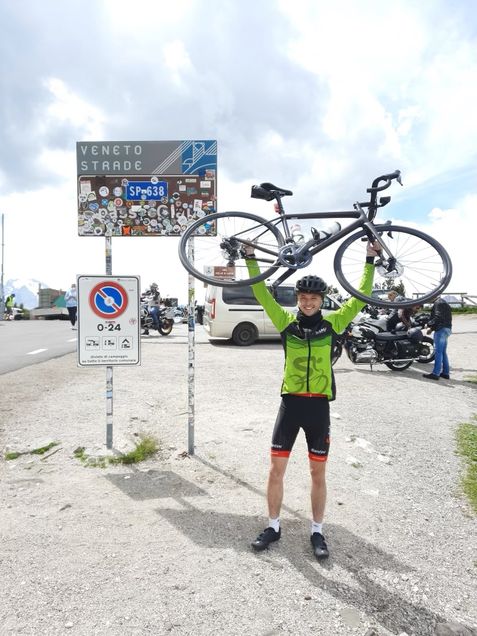
What inspired you to apply to medical school, and what was your journey to medical school like?
I decided that I wanted to pursue a medical education relatively late, because I had always associated medicine with a more traditional, but still demanding, ‘9-5’ job and not as a field with a lot of room for innovation and discovery. This view quickly changed when I started conducting stem cell and genomic research at Stanford, where I went to college. Professor Ioannidis helped me investigate the genetic predispositions of individuals with Polynesian ancestries to diseases. Simultaneously, Professor Chan helped me devise an approach to be able to observe stem-cell interactions at a resolution of individual cells. Both pursuits helped me appreciate the importance of biomedical research, exposing me to an aspect of medicine I had never seen before and convincing me that medicine is the right path.
Growing up in a family of physicians in Germany, I was exposed to the lifestyle of physicians early on, but I ultimately decided to forego the traditional high school to medical school track in Europe in order to be part of the culture of innovation at Stanford. At Stanford, I was drawn to computer science and engineering and was even part of a team that worked to send a model rocket to the stratosphere. Nevertheless, my later stem cell and genomic research also showed me the endless creativity that it takes to solve biomedical challenges as I began valuing the social implications of my work more. As a result, I aimed to widen the applicability of genomics to individuals who have not been represented in past genomic research, which I found very rewarding. At the same time I also began seeing that Silicon Valley’s innovative mindset can be united with a career in medicine and applied to medical schools after having spent one year conducting full-time research.
Why did you choose to attend BUSM?
A physician’s primary duty is to do what they can to help. To this end, I think that the Boston Medical Center is an ideal environment to grow into a caring physician with an understanding of the realities of healthcare in a country in which the medical safety net is relatively low.
Which part of your medical school experience are you most excited for?
I think that the clerkships in the final two years and the doctoring course in the first year are going to be incredibly exciting. Unlike the stem cell and genomic research that I have been so heavily involved in in my past four years, this early exposure to the healthcare setting will hopefully allow me to help others in a more direct way.
Why do you want to be a doctor?
I want to be a doctor because I think that one’s day-to-day work is more than a simple service. Growing up and seeing my parents talk about and practice medicine, it took me a while to understand that this was the reason behind the amount of time and effort they invested into their professions. Alongside my natural fascination for science and engineering, this value that doctors develop will hopefully allow me to make other people’s lives markedly better too.
What does your white coat mean to you?
To me, the white coat represents the desire to invest one’s productivity and intellectual curiosity toward causes that will primarily help other people. The white coat represents a willingness to be aware of one’s social surroundings, to listen and to try to help where one can as a way of life.
Rachel Allen
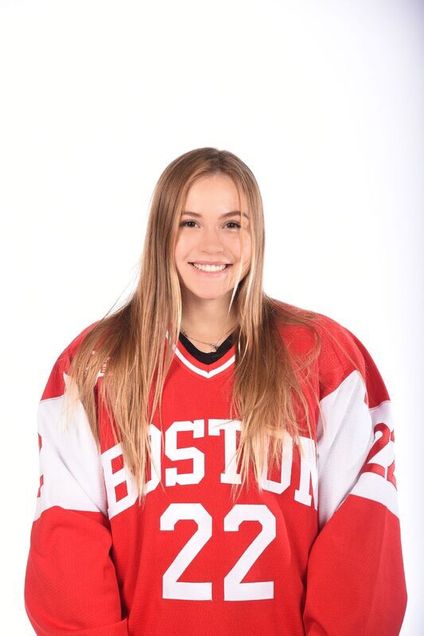
What inspired you to apply to medical school, and what was your journey to medical school like?
I’ve been interested in science, particularly human biology, for as long as I can remember. While in elementary school, my dog underwent surgery to remove a tumor. Hearing about my interest in his work, the veterinarian surgeon took me back to the operating room and showed me the various equipment he used in his practice. I was really interested in how he used his knowledge of science and his tools to help animals. From there, I decided that I also wanted to use my love of science to make lives better. In high school, I had the opportunity to do basic research at Case Western School of Medicine and enjoyed the task of coming up with creative solutions to medical problems. Consequently, I decided to study biomedical engineering.
Although I always held that interest in medicine, it was overshadowed for most of my life by my other passion: ice hockey. Since I started skating at seven years old, I always dreamed of playing college hockey. Years of hard work on and off the ice eventually culminated in representing Boston University on the women’s ice hockey team. Playing hockey presented me with challenges, particularly through injury, that allowed me to learn more about myself and grow as an individual. During my sophomore year of college, I suffered an injury leading to reconstructive surgery and a recovery process filled with setbacks and frustration. From the patient’s point of view, I saw how emotional support from doctors and my care team facilitated my rehabilitation and helped me overcome the mental challenges that accompany injury. Although I had thought of being a doctor for a long time, that experience invigorated me to begin really preparing myself to apply to medical school and to begin envisioning myself as a future physician.
Why did you choose to attend BUSM?
I have called Boston and Boston University home for the past four years. I attended BU for undergrad, represented BU on the women’s ice hockey team, shadowed at BMC, researched for BUSM and am a BMC patient. On both sides of care at BMC, I have been impressed with BUSM and BMC’s values of serving the whole patient with compassionate care. I know that studying medicine at BU will best equip me to treat underserved, diverse communities in my future practice.
Which part of your medical school experience are you most excited for?
I am humbled to have the opportunity to study medicine at BU School of Medicine and to work with the diverse patient population at BMC. I look forward to opportunities to support the clinicians at BMC and to spend time with patients, hear their stories, and support them as best I can. Also, while I have had the opportunity to explore many facets of medicine as a medical scribe, observer and patient, there are so many other medical specialties I have yet to delve into. I am eager to explore different specialties in medical school and find the one that calls to me.
Why do you want to be a doctor?
The best, most fulfilling profession for any person should be something that excites, challenges and scares them. I know that medicine satisfies that role for me.
When I was very young, after I learned that my grandmother had a kidney examination, I discovered the amazing, unseen inner workings of the body, particularly the kidneys. My mother likes to tell me a story of my young self enthusiastically pointing out where my family and friends could find their own kidneys. Since then, I have been passionate about science, leading me to pursue advanced science classes in high school and study biomedical engineering in college. While I found meaning in undergraduate research and was attracted to the emphasis on problem-solving and creativity in engineering, I wanted to be in a role that would allow me to see directly how my efforts would positively impact others. During my first shadowing experience shortly after high school, I saw how empathy and the relationships that physicians foster with their patients make a difference. I realized that being a physician satisfies my desire to tackle pressing problems in medicine and bring compassion and respect to those who need it most. That is the most humbling, challenging, and worthwhile task for me.
What does your white coat mean to you?
To me, the white coat is the conclusion of a significant chapter in my life, and the start of an exciting and humbling new one. The white coat signifies the years of hard work, studying and perseverance that brought me to medical school. It also represents and validates the support of my family, friends and mentors who helped me reach this moment. Although the White Coat Ceremony is an important moment to reflect on my journey so far, the pristine white coat marks a new, lifelong responsibility: to advocate and care for patients and to continuously strive to improve the health of my community. I know that the path ahead of me is challenging, but I know that it is the path for me.
Frederic Fabiano
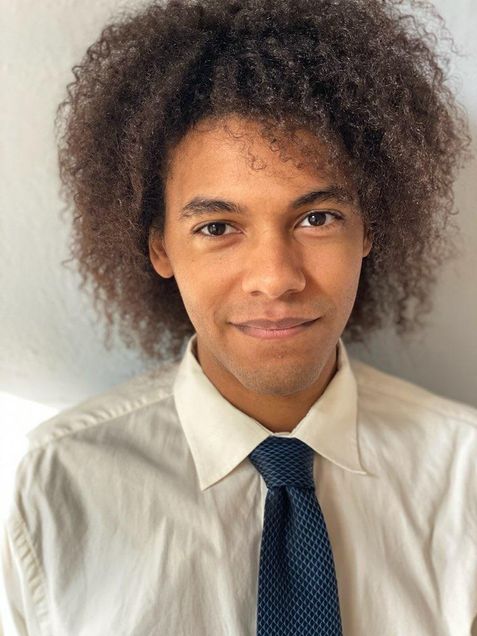
What inspired you to apply to medical school, and what was your journey to medical school like?
Although I’ve always known I wanted to be a doctor, I was most inspired by my shadowing experiences with patients and families whose medical needs were caused by a history of chronic disease and health disparities. Shadowing in Washington Heights and Harlem in New York City in diverse communities with low-income and immigrant families showed me the importance of culturally competent physicians in treating a community. The doctors I observed exemplified the importance of being socially aware of patients’ lives and culture. This experience, among others, solidified my decision to apply to medical school.
For most of my life I’ve stood out for one reason or another. As an African-American man, people would assume things about me that I knew weren’t true, but still left me doubting myself deep down. When I was accepted to my undergraduate university, a few high school classmates approached and told me that I “didn’t deserve” to get in over other students. I knew it wasn’t true, but over the next few years I never forgot their words and what they were implying. I was still discovering who I was, and there were moments when I thought that perhaps I really shouldn’t be there. Now, however, I see being “different” as something to be celebrated rather than ashamed of. I spent a good part of my undergraduate years becoming friends with diverse individuals, artists, writers and other misfits. People who helped me keep perspective of the world and who supported me when my confidence wavered.
After graduation and a gap year, I began the BU Master of Science in Medical Sciences Program. The program helped prepare me for medical school and eliminated any doubts about my desire to become a physician. It made me excited to finally, truly start my journey toward a career in medicine.
Why did you choose to attend BUSM?
BUSM’s mission to provide care for all people is what attracted me, and I’m happy to have the opportunity to be a part of it. My parents grew up in poverty, sometimes without health insurance or access to high quality healthcare. I have seen firsthand the effects that lack of access to healthcare can have on a community. I wanted to attend a medical school that provided outstanding care to underserved and marginalized people. BUSM understands the importance of diversity in increasing health equity and decreasing health disparities.
After I completed the M.S. in Medical Science Program at BUSM, I knew that this was the right school for me. The faculty were supportive and listened to student concerns. There was a strong emphasis placed on staying healthy, both physically and mentally. I can think of no better place to begin my medical career.
Which part of your medical school experience are you most excited for?
I am most excited to meet and interact with my fellow classmates. Each of us is starting a new path in life, learning new things, and experiencing this exciting journey together. We come from different communities, have diverse stories and backgrounds and are all working toward the same goal. I’m sure there will be late night studying and tremendous amounts of information to absorb, but I know the friends I meet along the way will be right there alongside me. Knowing I’ll be with lifelong friends is truly special, and will make the journey much more enjoyable.
Why do you want to be a doctor?
My desire to become a doctor stems from my observation of the effect that limited healthcare access has had on my extended family.
My mother’s family has lived in Alabama for generations. Poverty and racism have fueled their struggles with chronic diseases such as hypertension, diabetes and heart disease. My father’s parents were Italian immigrants who arrived unable to speak English, looking for a better life. They had little access to healthcare due to a lack of health insurance and low socioeconomic status. Both sides of my family experienced discrimination in the healthcare system. Poverty, poor nutrition and unstable housing led to preventable health problems.
As a physician, I plan to advocate for health equity and work to eliminate health disparities that disproportionately affect communities of color and sexual minorities.
What does your white coat mean to you?
During the height of the COVID-19 pandemic, my father, a retired physician, was asked to return to the hospital to help relieve some of the overworked frontline healthcare providers. Despite his age and chronic lung problems, he went into the hospital that very week. He has been my example of a true physician for my entire life and, as a future healthcare provider, I recognize that I may one day be asked to make the same kind of selfless decision that he did.
It is this story that comes to mind when I think of the significance of the white coat. The white coat is not only tangible proof of my hard work that has brought me to medical school, but also my potential to improve the lives of others in the future. It represents professionalism, empathy selflessness and commitment to a life of service.
Fiona Cerf
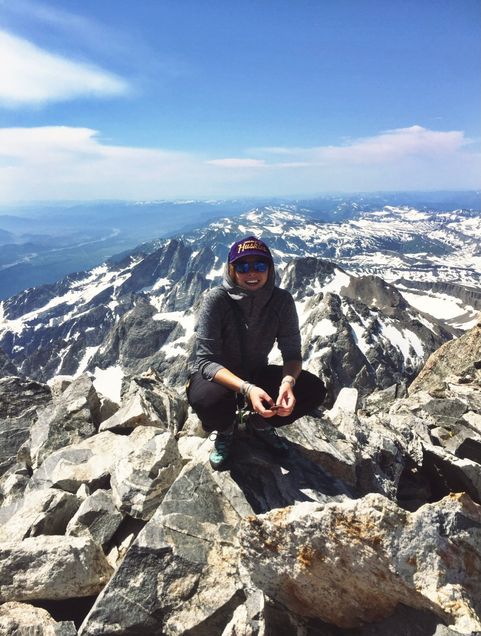
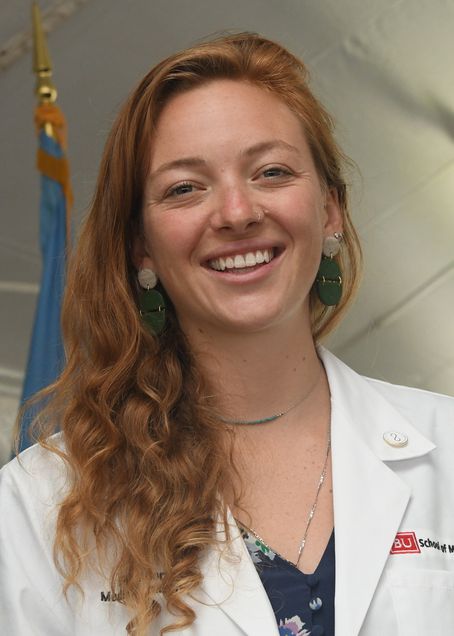
What inspired you to apply to medical school, and what was your journey to medical school like?
While to the outsider, my journey to medical school it may have looked like a winding path and even nonsensical at times, to me, it made perfect sense. It has been this amalgamation of extraordinary experiences – some deeply rooted in the medical world and many seemingly very far from it – that led me right back to where I began, with a deep desire to practice medicine.
I graduated from Colorado College with a degree in environmental science. I was initially drawn to the field by a passion for understanding the root systems of the natural world and how they interact with and exacerbate social inequality, but as my studies progressed, I found myself being pulled deeper into a world of pipettes and policy papers, and farther from people. Toss in a few experiences that changed my life completely – falling in love with wilderness medicine or suddenly losing my mother, who was also a family doc and my absolute best friend and role model when I was 21, and I felt like I had found myself back on the path to medicine.
So after pulling applications for jobs in the environmental world, I graduated from Colorado College and returned to the wild rivers of the American West. From there each decision I made was from a place of wanting to learn as much as I could. Not just about medicine, but how I could best contribute to its practice. I moved to a small fishing town in Ecuador for a stint, and then found a home in Southern Mexico and work in a local medical clinic until the river season began again. After another season on the river, I returned to my home in Seattle to dive deeper into the social dimension of medicine – I worked as a caregiver and artistic assistant to a tetraplegic artist who has become a mentor to me. I volunteered in an addiction recovery center and a shelter for houseless young adults, and I interned at a hospital. Oh, and I completed a post-bac program at Scripps somewhere in there.
So in short – my journey has taken me from the mountains of Colorado to the cobblestone streets of Mexico, from the rivers of the West to art studios and hospital hallways in Seattle. It has introduced me to people who have changed my life and it has taught me so very much about myself and about the impact that I want to have through medicine. And from all of that, it has taken me to BUSM – which feels like the perfect next step for me.
Why did you choose to attend BUSM?
I was drawn to BUSM because it is a community that does not just recognize the socioeconomic barriers in medicine but leads the charge in combating them through bold initiatives and innovative programs – from addressing food security by way of urban farming and community education to bringing resources directly to the medically underserved. With my ambition to remediate the flawed relationship between our healthcare system and our most vulnerable communities through a hands-on and holistic medical approach, it felt like there was no better ecosystem to continue my education in than the one created at BUSM.
Which part of your medical school experience are you most excited for?
I am most excited to be totally out of my comfort zone. I think we all have this (probably romanticized) idea of what medical school and even being a doctor will be like. I know that I do! But at the same time visualizing this novel experience isn’t easy, and while that is really scary, it also feels very exciting and important to me. I see medical school as an experience of total discovery – one that will grant me access to people, information, and systems of understanding that will be totally new and formative to me. I have no idea what this experience will look like – what moments will push me, scare me, take my breath away. So I know it’s a bit vague, but that unknown, and the chance to lean into it entirely, is what I’m most excited about.
Why do you want to be a doctor?
This question always makes me a bit emotional because it feels like what makes me, me – from the people who raised me to the decisions that have shaped me and all of the lessons I’ve learned in between – those are also the reasons that make me sure that I want to become a physician. It’s the compassion I was raised on as I grew up by my mother’s side, accompanying her as a kid to the homes of those who need care, realizing that as a family doc, my mom had this superpower not just to heal and help so many, but to connect to the community in such a beautiful way. It’s affirming to me that I share that drive of hers through my days as a caregiver – knowing that when I go to my client’s house and recognize that it’s a day of pain, I don’t want to shrink back. I want to step forward and join him in this intensely human moment.
It’s the confidence that being a river guide has nurtured in me – knowing that in moments of crisis, time seems to slow down and I am able to operate, focused and calm. It’s the joy I felt when I watched a man paralyzed from the chest down row a gear boat down the river after I stayed up late into the night building a contraption for him so I could teach him how to row. It’s realizing that I can use my skills and love for hands-on creative problem solving to bolster my ability to help others.
I feel as if I’ve been collecting these puzzle pieces, some I found intentionally while others were a gift. They may look a bit different when viewed alone, but as I continue this pursuit of medicine, they seem to find each other and fit together quite nicely.
What does your white coat mean to you?
For me, my white coat represents the unification of what has gotten me here today and what will guide me forward from here on out – It is all my puzzle pieces coming together! It is a reminder of my alacrity and why I worked so hard to get here and of the immense privilege and honor, it is to be on the path to becoming a physician. It represents my commitment to community, to doing good, to showing up for others each day and to soaking up every morsel of the next four years so that I can be the best physician I can be.
